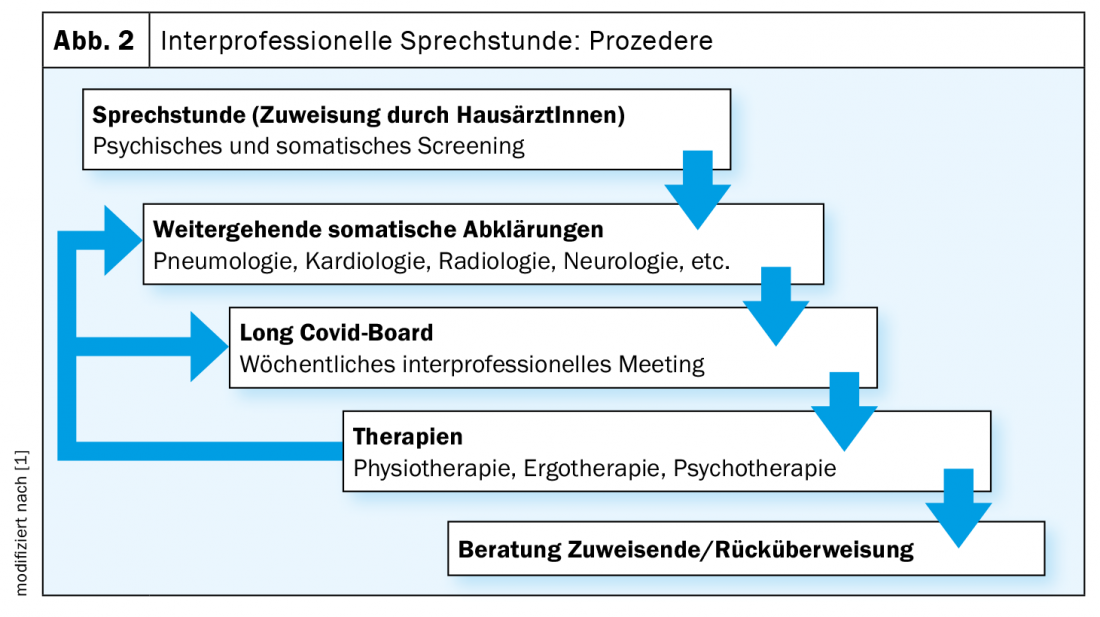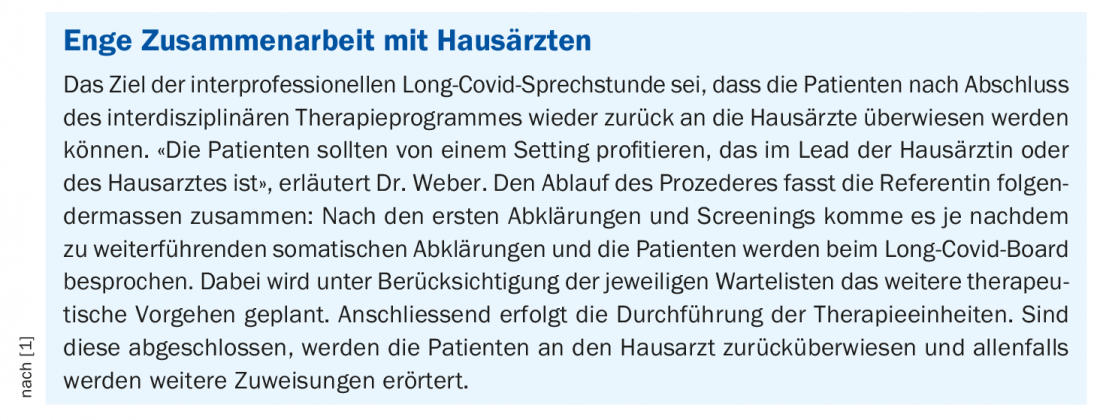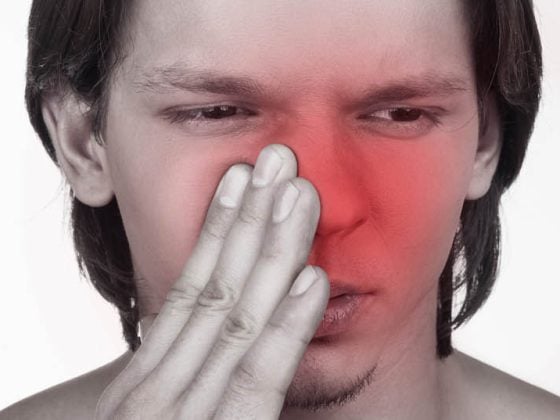Even after a mild covid infection, prolonged symptoms can occur that significantly limit those affected. There are an increasing number of clinical facilities that offer specialized consultations and programs. The head of the interprofessional Long Covid consultation at the Waid City Hospital in Zurich reported on her experience to date at this year’s symposium of the Association of General and Specialized Internists Zurich.
Long Covid is a much-discussed topic that attracts a great deal of public interest. “We in the Long Covid consultation work primarily with patients who still have symptoms after 12 weeks,” explains chief physician Elisabeth Weber, MD, cantonal medical service and head of the interprofessional Long Covid consultation at Waid City Hospital [1].
The implications of these complaints can be significant and it is important to provide appropriate support to patients, he said. From May 2021 to January 2022, 130 patients were referred to the interprofessional consultation at Stadtspital Waid. Of these patients, 50 completed care, 50 were under ongoing treatment, and 30 were referred to other centers. Long covid/post covid prevalence data vary by study and data source, respectively. Approximately 10-30% of those with Covid-19 are thought to have a prolonged symptom course [2]. In a study including 143 covid patients, 60 days after infection, 32% complained of 1 or 2 symptoms and 55% complained of at least 3 symptoms [3]. Vaes et al. 2021 have collected data from 239 Covid-19 patients over the long-term [4]. It was shown that the complaints decreased in the period of 3-6 months after the acute phase of the disease. This also had an impact on performance, but about half of the study participants still exhibited work absences during this phase. The proportion of those who self-assessed their health as good was 16.7% after this period.
Fatigue complaints are very common
Currently, there is no universally accepted uniform professional definition for symptoms after the acute phase of a covid-19 infection. According to the current guideline, long covid refers to the presence of symptoms beyond 4 weeks after the onset of acute covid 19 disease [5]. (Fig. 1). Clinical studies also find the term “persistently symptomatic (prolonged) covid-19 infection” in the period from 4 to 12 weeks after the acute phase of illness and that of “post-covid-19 syndrome” defined by symptoms persisting beyond 12 weeks that are not explained by an alternative diagnosis [2]. The likelihood of developing long covid syndrome is independent of the severity of the acute infection and it does not matter whether the affected individuals were hospitalized or not [2]. Different organ systems can be affected. Very common symptoms include fatigue, dyspnea, impaired performance, headache, olfactory and gustatory disturbances [7]. Fatigue is a very dominant symptom in Long Covid patients, Dr. Weber points out.

Is long covid a disease entity in its own right?
It is difficult to assess how high the psychological component is in patients with prolonged covid symptoms, he said. It could be that the underlying psychological conditions for long covid and burnout are similar, the speaker said. About half have experienced burnout in the past, but there seem to be other components in Long Covid, this can be well differentiated by the sufferers, explains Dr. Weber [1]. Addressing individual patients who complain of Long Covid-like symptoms after SARS-CoV-2 vaccination, Dr. Weber cautions that care should be taken in interpretation. “Long Covid is a huge barrel,” said the speaker [1]. Fatigue problems also occur in the context of other underlying diseases, such as multiple sclerosis or obstructive sleep apnea syndrome, and are also a known phenomenon after viral diseases such as influenza or EBV. Many experts believe that long covid is a separate entity in the sense of a multisystem disease. Dr. Weber also believes that this is true in those patients who continue to have symptoms more than 3 months after covid-19 disease for which there is no other explanation.
Long Covid Board: Interdisciplinary and pragmatic treatment concept
There are several hypotheses regarding etiological factors, but none of them has been empirically proven so far. Various mechanisms, such as functional limitations of multiple organ systems due to tissue damage, as well as postviral autoimmunity, are discussed [8]. Similar courses to long covid have been reported with other coronaviruses (e.g., SARS-CoV-1 and MERS), and these have pathophysiologic parallels with post-acute covid-19 [2]. Although most of these patients recover slowly or spontaneously with holistic support, rest, symptomatic treatment, and slow increase in activity. Serious health complications are very rare. Therefore, it is important to treat patients pragmatically and avoid overdiagnosis [2].

The goal of the outpatient Long Covid consultation at Waid City Hospital is to provide a point of contact for patients and primary care providers [1]. The service, which is based on a holistic care concept, is aimed primarily at those affected in and around Zurich. In addition to physicians (internists), the interprofessional team also includes specialists from the fields of physiotherapy, occupational therapy, psychology/neuropsychology as well as an outpatient nursing service and a psychosocial Spitex. If necessary, other points of contact are also referred. “The centerpiece of our work is the Long Covid board,” she said. In addition to case discussions, new scientific findings are also discussed there in the course of weekly meetings. The therapeutic procedure is based on a somatopsychic and interprofessional approach (Fig. 2). Important aspects include education, reassurance and taking the patient seriously. Guidance on energy management is also an essential component related to the common fatigue problem.

Patients are referred by primary care physicians and the waiting time is about 4-6 weeks (box). The interprofessional consultation mainly sees patients who have persistent symptoms 12 weeks after the onset of acute covid 19 disease. Earlier assignments are possible, and triaging then takes place, Dr. Weber explains.
Source: VZI Symposium
Literature:
- Weber E: Long Covid – Experiences from interprofessional consultation. KD Elisabeth Weber, MD, VZI Symposium 12.01.2022
- Chmiel C: Long Covid/PASC (Post acute sequelae of SARS-CoV-2 infection). Factsheet. Last modified 10/2021, www.medix.ch/wissen/guidelines/infektionskrankheiten/Long covid-pasc-post-acute-sequelae-of-sars-cov-2-infection-factsheet (last accessed 03/04/2022).
- Carfì A, Bernabei R, Landi F: Gemelli Against COVID-19 Post-Acute Care Study Group. Persistent Symptoms in Patients After Acute COVID-19. JAMA 2020; 324(6): 603-605.
- Vaes AW, et al: Recovery from COVID-19: a sprint or marathon? 6-month follow-up data from online long COVID-19 support group members. ERJ Open Res 2021; 7(2): 00141-2021.
- Rabady S, et al: Guideline S1: Long COVID: Wien Klin Wochenschr 2021; 133: 237-278.
- Sivan M, Taylor S: NICE guideline on long covid. BMJ 2020; 371: m4938. DOI:10.1136/bmj.m4938
- German Bundestag, www.bundestag.de/resource/blob/845546/c69b018b3a2ebd126c2589286de6e8cd/19_14_0345-5-_Arbeitsgemeinschaft-der-Wissenschaftlichen-Medizinischen-Fachgesellschaft_Long Covid-data.pdf (last accessed 04.03.2022).
- Puta C, Haunhorst S, Bloch W: Sports Orthopaedics and Traumatology 2021; 37(3): 214-225.
- Koczulla AR, et al: S1 Guideline Post-COVID/Long Covid. AWMF Register No. 020/027, as of 12.07.2021.
HAUSARZT PRAXIS 2022; 17(3): 4-5
InFo NEUROLOGY & PSYCHIATRY 2022; 20(2): 38-39.











